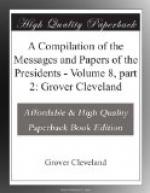The lapse of ten years since the negotiation of the Burlingame treaty has exhibited to the notice of the Chinese Government, as well as to our own people, the working of this experiment of immigration in great numbers of Chinese laborers to this country, and their maintenance here of all the traits of race, religion, manners, and customs, habitations, mode of life, segregation here, and the keeping up of the ties of their original home, which stamp them as strangers and sojourners, and not as incorporated elements of our national life and growth. This experience may naturally suggest the reconsideration of the subject as dealt with by the Burlingame treaty, and may properly become the occasion of more and circumspect recognition, in renewed negotiations, of the difficulties surrounding this political and social problem. It may well be that, to the apprehension of the Chinese Government no less than our own, the simple provisions of the Burlingame treaty may need to be replaced by more careful methods, securing the Chinese and ourselves against a larger and more rapid infusion of this foreign race than our system of industry and society can take up and assimilate with ease and safety. This ancient Government, ruling a polite and sensitive people, distinguished by a high sense of national pride, may properly desire an adjustment of their relations with us which would in all things confirm and in no degree endanger the permanent peace and amity and the growing commerce and prosperity which it has been the object and the effect of our existing treaties to cherish and perpetuate.
I regard the very grave discontents of the people of the Pacific States with the present working of the Chinese immigration, and their still graver apprehensions therefrom in the future, as deserving the most serious attention of the people of the whole country and a solicitous interest on the part of Congress and the Executive. If this were not my own judgment, the passage of this bill by both Houses of Congress would impress upon me the seriousness of the situation, when a majority of the representatives of the people of the whole country had thought fit to justify so serious a measure of relief.




